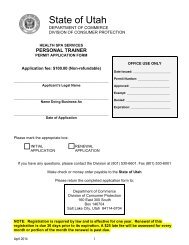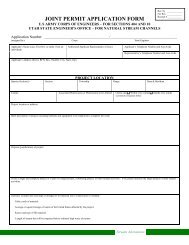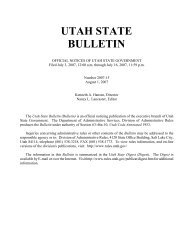Vol. 2010, No. 11 (06/01/2010) PDF - Administrative Rules - Utah.gov
Vol. 2010, No. 11 (06/01/2010) PDF - Administrative Rules - Utah.gov
Vol. 2010, No. 11 (06/01/2010) PDF - Administrative Rules - Utah.gov
Create successful ePaper yourself
Turn your PDF publications into a flip-book with our unique Google optimized e-Paper software.
DAR File <strong>No</strong>. 33650<br />
NOTICES OF PROPOSED RULES<br />
(ii) the mistake is not clearly evident on the face of the<br />
proposal, but the offeror submits proof of evidentiary value which<br />
clearly and convincingly demonstrates both the existence of a<br />
mistake and the correct offer and the correction would not be<br />
contrary to the fair and equal treatment of other offerors.<br />
(d) Withdrawal of Proposals. If discussions are not held,<br />
or if the best and final offers upon which award will be made have<br />
been received, the offeror may be permitted to withdraw the<br />
proposal if:<br />
(i) the mistake is clearly evident on the face of the<br />
proposal and the correct offer is not; or<br />
(ii) the offeror submits proof of evidentiary value which<br />
clearly and convincingly demonstrates that a mistake was made but<br />
does not demonstrate the correct offer or, if the correct offer is also<br />
demonstrated, to allow correction on the basis that the proof would<br />
be contrary to the fair and equal treatment of other offerors.<br />
(4) Mistakes Discovered After Award. Mistakes shall not<br />
be corrected after award of the contract.<br />
3-214 Award.<br />
(1) Award Documentation. A brief written justification<br />
statement shall be made showing the basis on which the award was<br />
found to be most advantageous to the state taking into consideration<br />
price and the other evaluation factors set forth in the Request for<br />
Proposals.<br />
(2) One Proposal Received. If only one proposal is<br />
received in response to a Request for Proposals, the procurement<br />
officer may, as the officer deems appropriate, either make an award<br />
or, if time permits, resolicit for the purpose of obtaining additional<br />
competitive sealed proposals.<br />
3-215 Publicizing Awards.<br />
(1) After the selection of the successful offeror(s), notice<br />
of award shall be available in the purchasing agency's office and<br />
may be available on the internet.<br />
(2) The following shall be disclosed to the public after<br />
notice of the selection of the successful offeror(s) and after receipt<br />
of a GRAMA request and payment of any lawfully enacted and<br />
applicable fees:<br />
(a) the contract(s) entered into as a result of the selection<br />
and the successful proposal(s), except for those portions that are to<br />
be non-disclosed under R33-3-204;<br />
(b) the unsuccessful proposals, except for those portions<br />
that are to be non-disclosed under R33-3-204;<br />
(c) the rankings of the proposals;<br />
(d) the names of the members of any selection committee<br />
(reviewing authority);<br />
(e) the final scores used by the selection committee to<br />
make the selection, except that the names of the individual scorers<br />
shall not be associated with their individual scores or rankings.<br />
(f) the written justification statement supporting the<br />
selection, except for those portions that are to be non-disclosed<br />
under R33-3-204.<br />
(3) After due consideration and public input, the<br />
following has been determined by the Procurement Policy Board to<br />
impair <strong>gov</strong>ernmental procurement proceedings or give an unfair<br />
advantage to any person proposing to enter into a contract or<br />
agreement with a <strong>gov</strong>ernmental entity, and will not be disclosed by<br />
the <strong>gov</strong>ernmental entity at any time to the public including under<br />
any GRAMA request:<br />
(a) the names of individual scorers in relation to their<br />
individual scores or rankings;<br />
(b) non-public financial statements; and<br />
(c) past performance and reference information, which is<br />
not provided by the offeror and which is obtained as a result of the<br />
efforts of the <strong>gov</strong>ernmental entity. To the extent such past<br />
performance or reference information is included in the written<br />
justification statement, it is subject to public disclosure.<br />
3-216 Exceptions to Competitive Sealed Proposal<br />
Process.<br />
(1) As authorized by Section 63G-6-408(1) the Chief<br />
Procurement Officer or designee may determine that for a given<br />
request it is either not practicable or not advantageous for the state<br />
to procure a commodity or service referenced in section 3-2<strong>01</strong><br />
above by soliciting competitive sealed proposals. When making<br />
this determination, the Chief Procurement Officer may take into<br />
consideration whether the potential cost of preparing, soliciting and<br />
evaluating competitive sealed proposals is expected to exceed the<br />
benefits normally associated with such solicitations. In the event of<br />
that it is so determined, the Chief Procurement Officer, head of a<br />
purchasing agency or designee may elect to utilize an alternative,<br />
more cost effective procurement method, which may include direct<br />
negotiations with a qualified vendor or contractor.<br />
(2) Documentation of the alternative procurement method<br />
selected shall state the reasons for selection and shall be made a part<br />
of the contract file.<br />
3-217 Multiple Award Contracts for Human Service<br />
Provider Services.<br />
The Chief Procurement Officer, head of a purchasing<br />
agency or designee may elect to award multiple contracts for<br />
Human Service Provider Services through a competitive sealed<br />
proposal process by first determining the appropriate fee to be paid<br />
to providers and then contracting with all providers meeting the<br />
criteria established in the RFP. However this specialized system of<br />
contracting for human service provider services may only be used<br />
when:<br />
(1) The agency has performed an appropriate analysis to<br />
determine appropriate rates to be paid;<br />
(2) The agency files contain adequate documentation of<br />
the reasons the contractor was awarded the contract and the reasons<br />
for selecting a particular contractor to provide the service to each<br />
client; and<br />
(3) The agency has a formal written complaint and appeal<br />
process, notice of which is provided to the contractors, and an<br />
internal audit function to insure that selection of the contractor from<br />
the list of awarded contractors was fair, equitable and appropriate.<br />
. . . . . . .<br />
R33-3-7. Types of Contracts.<br />
3-7<strong>01</strong> Policy Regarding Selection of Contract Types.<br />
(1) General. The selection of an appropriate contract type<br />
depends on factors such as the nature of the supplies, services, or<br />
construction to be procured, the uncertainties which may be<br />
involved in contract performance, and the extent to which the<br />
purchasing agency or the contractor is to assume the risk of the cost<br />
of performance of the contract. Contract types differ in the degree<br />
of responsibility assumed by the contractor for the costs of<br />
UTAH STATE BULLETIN, June <strong>01</strong>, <strong>2<strong>01</strong>0</strong>, <strong>Vol</strong>. <strong>2<strong>01</strong>0</strong>, <strong>No</strong>. <strong>11</strong> 31


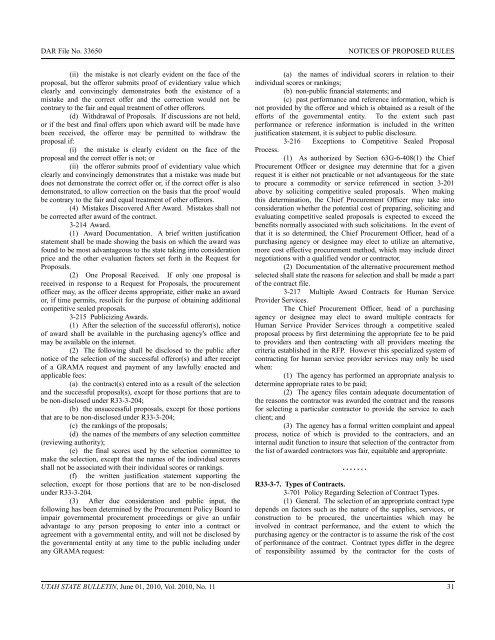

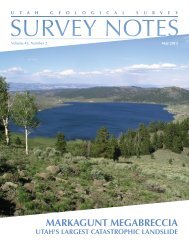
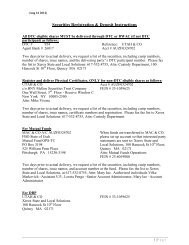
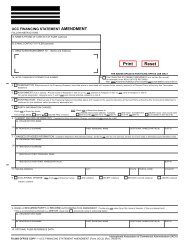
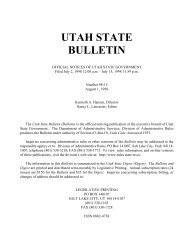
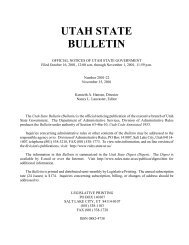


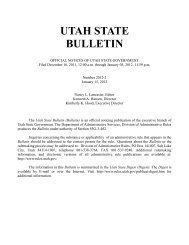
![Lynx avoidance [PDF] - Wisconsin Department of Natural Resources](https://img.yumpu.com/41279089/1/159x260/lynx-avoidance-pdf-wisconsin-department-of-natural-resources.jpg?quality=85)
